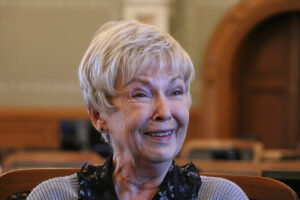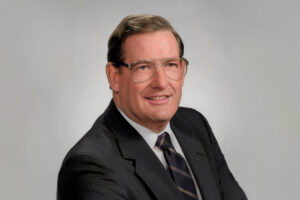Topic: Townships

Interview of Nancy Brown, October 18, 2019
Interviewed by Joan Wagnon
This interview with Nancy Brown covers not only the ten years of her legislative career but her volunteer work on the local (township), state, and national levels. Her philosophy of focusing on the issues rather than party positions sometimes created problems for her within the Republican caucus. Her focus on local issues, from the Stanley Sewer Crisis to annexation to the Blue Valley Recreation Commission created legislative battles but left lasting change that she feels benefited her rural constituencies. She worked on a variety of women's issues, such as expanding funding for mammograms and discussed in detail Show Morehow the legislature was changing its attitude towards women members. She explains how she managed her family, particularly her school-age children during her time in the legislature. The interview concluded with Dr. Annie Miller of the Washburn University Political Science Department leading Brown through a discussion of personal identity and its impact on her legislative career. Show Less

Interview of Carl Holmes, September 3, 2020
Interviewed by Rex Buchanan
In this 2020 oral history interview, former State Representative Carl Holmes discusses his observations of state water policy formulation in the 1970's through 2012. Holmes began his involvement in water policy as a farmer and active member of his community in southwest Kansas. In many respects, his experiences reflect the water-energy nexus. Holmes describes how he had observed cities and irrigators mining water in southwest Kansas. He recalls developing a comprehensive understanding of water issues by interviewing the managers of the state’s water resources. In this interview, Holmes describes how he managed the House Energy and Natural Resources Committee by Show Morecreating subcommittees and educating members on how to work bills and guide them through the process. He discusses his bipartisan work with Representative Ken Grotewiel and other committee Democrats in the 1990s, actions that resulted in the Speaker removing him from the chairmanship of the committee. Holmes describes how irrigation changed over time from flood to sprinklers and how the sprinkler systems have become more efficient. However, Holmes observed that groundwater levels continue to decline leading to abandoned wells, the growing of crops that require less water, the return to dryland farming, and, for some, the call for diversion of water from distant sources, such as the Missouri River, to sustain farming and communities on the plains. Show Less
